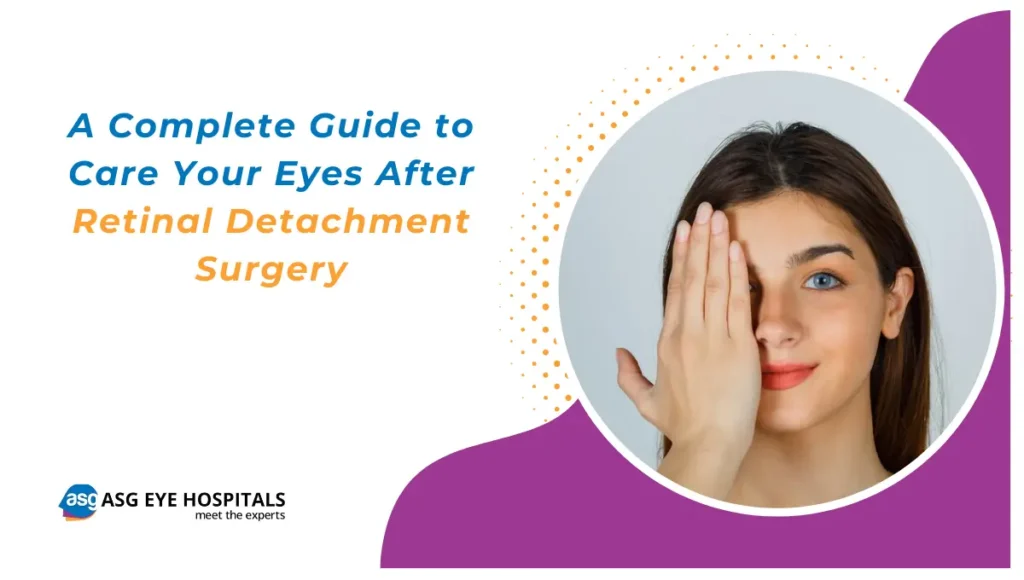Have you recently undergone retinal detachment surgery? Or maybe you know someone who has? Whether you’re the patient or a supportive friend or family member, understanding how to care for the eyes after such a procedure is crucial for a successful recovery.
If you are interested in learning how to take care of your eyes after retinal detachment surgery, keep reading this blog. In this, we will discuss the importance of post-retinal detachment surgery care for a smooth recovery.
What is Retinal Detachment Surgery?
Before understanding post-surgery care, it’s essential to grasp some basics of retinal detachment surgery. The retina is light-sensitive, and the internal layer of the wall of the eye is made up of light-sensitive cones and roads that detect the pattern, shape, and color.
Retinal detachment occurs when the thin layer of tissue (the choroid) at the back of the eye (the retina) pulls away from its normal position. The choroid supplies oxygen and nutrients. When the retina is detached from the choroid, it loses its function, due to this detachment, vision is lost.
The retinal detachment symptoms you may notice, are retinal tears by the sensation of flashing light, dark spots and many floaters, and darkening of side vision or peripheral vision. Retinal Detachment Surgery is necessary to reattach the retina and prevent permanent vision loss. Surgery reattaches the retina back to the eye and seals holes and breaks. There are various surgeries for retinal detachment, including scleral buckle, pneumatic retinopexy, and vitrectomy, each surgery addresses the particular needs of the patient.
How to Take Care of Your Eye after Retinal Detachment Surgery?
Immediate care after Retinal Detachment Surgery
- Right after the retinal detachment surgery, your eye will likely be covered with a patch or shield to protect it.
- It’s normal to experience some discomfort, mild pain, or itching in the eye after surgery.
- Your eye specialist prescribes painkillers, medication, and eye drops to reduce the discomfort and prevent infection.
- You should follow the instructions given by your surgeon regarding medication dosage and frequency diligently.
- You may need to stay in the hospital overnight or longer.
Rest and Recovery
- During the postoperative period of retinal detachment surgery, rest is essential for the healing process.
- Avoid strenuous activities, heavy lifting, or bending over, as these actions can increase pressure in the eye and potentially dislodge the retina.
- keep your head elevated while sleeping to reduce swelling and promote healing.
Regular follow-up Appointments
- Regular follow-up appointments with your ophthalmologist are important for monitoring your progress and making sure that your eye is healing properly.
- During these appointments, your eye specialist will examine your eye, remove any necessary stitches, and assess your vision.
- Be sure to attend all scheduled appointments and communicate any concerns or changes in your symptoms to your eye specialist.
Protect Your Eyes
- After retinal detachment surgery, protecting your eyes from further injury or strain is important.
Wear any eye shields or protective glasses recommended by your surgeon, especially when sleeping or engaging in activities that could pose a risk to your eyes. - Avoid rubbing or touching your eyes, and refrain from swimming or participating in contact sports until your doctor gives you the green light.
Monitoring Symptoms
While some discomfort and blurry vision are normal after retinal detachment surgery, certain symptoms may indicate a complication requiring immediate medical attention. Contact your eye specialist immediately if you experience any of the following:
- Sudden increase in pain or discomfort
- Severe or worsening vision loss
- Flashes of light or new floaters in your vision
- Persistent redness, swelling, or discharge from the eye
- A curtain-like shadow or veil obscuring your vision
Healthy Lifestyle Choices
- Maintaining a healthy lifestyle supports the recovery process and promotes overall eye health.
- Eat a balanced diet rich in fruits, vegetables, and omega-3 fatty acids, which are beneficial for eye health.
- Avoid smoking and limit alcohol consumption, as these habits can negatively impact your eye health and impede healing.
Conclusion:
Recovery from retinal detachment surgery requires patience, diligence, and proper care. Following the guidance outlined in this comprehensive guide can support your eye’s healing process and maximize the likelihood of successful results. Remember to prioritize rest, attend all follow-up appointments, protect your eyes from injury, and closely monitor any changes in your symptoms. With the right care and attention, you can confidently navigate the post-surgery period and protect your vision for the future.



